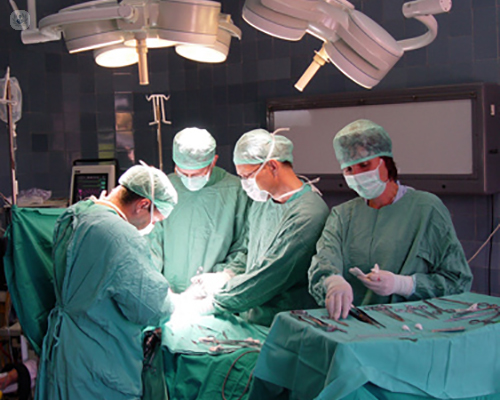Mesh for hernia repair: the best way to treat inguinal hernias?
Written by:There has been a great deal of interest recently in the press about problems associated with meshes in hernia repairs and the possibility of hernia repairs being performed without mesh. A recent expert paper written by some of the world’s leading hernia surgeons continues to say that the use of mesh in inguinal hernia repairs is the best way to treat this condition.
Expert surgeon Mr James Smellie discusses how the internet may influence which method is used during hernia repair, as the mesh has recently endured a bad reputation online and caused a divide. Really, a treatment plan should be made based on the individual case and with a doctor who willingly discusses the patient’s options with them.

Why have meshes received such criticism recently?
The reason that meshes have become unpopular in recent months is related to their previous use in pelvic prolapse surgery, by gynaecologists, where the mesh is located close to the top of the vagina. This has resulted in some real problems in some women; and the use of meshes at this site is reasonably being questioned. The worry about meshes has subsequently widened into the use of this support in hernia repair although the anatomy of the hernias is completely different to the anatomy of the vagina.
Why use a mesh in inguinal hernia surgery?
The two main risks with inguinal hernias are of recurrence and of post-operative pain in the groin. No single technique avoids both of these main complications. It is known that by performing a Lichtenstein hernia repair that the recurrence rate drops to around one in 200 where it probably was as high as one in 10 with the old darn repairs (a more traditional technique). It is for this reason that there is such a strong surgical inclination to use mesh. Open repairs have half the recurrence rate of that of laparoscopic surgery (so-called ‘keyhole surgery’), although the incision length is similar now for laparoscopic and open surgery with the techniques I make use of).
Post-operative pain after hernia repair is a very difficult issue. Although some authors and advertorial sites on the Internet suggest that the rate of post-operative pain is very high this does not seem to be the experience of many surgeons such as myself in their routine practice.
The key issue is to distinguish patients who have groin pain related to a sports injury and who have, or may not have, a hernia at the same time. In these patients operation is unlikely to improve pain and may worsen it and I strongly believe that this group of patients is responsible for the high levels of post-operative pain in some series.
Nevertheless good technique with minimum sutures, small incisions. preservation of both posterior nerves in the inguinal canal and minimising the section of the cord are in my opinion very important for reducing post-operative pain. Finally some patients suffer severe bruising which, although inevitable, can be largely avoided by meticulous technique.
Why is the doctor/patient relationship important when deciding the best treatment plan?
Modern surgery involves tailoring the advice given to patients taking into account patient preference and hard scientific fact; adding in expert experience learned over decades of practice; an open mind to new scientific advances, but also a healthy dose of scepticism about claims made on the Internet about new techniques from clinics keen to sell the product to many patients. It is a minefield for patients to navigate the claims and counterclaims on the Internet; to be fair this is hardly surprising since there is so little agreement amongst many surgeons. The answer lies in including the patient in the discussion.
If you are interested in inguinal hernia repair or learning more about the mesh procedure, book an appointment with a specialist.



